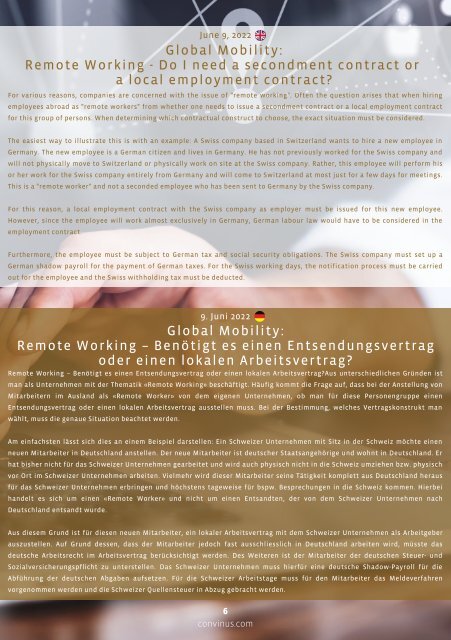CONVINUS Global Mobility Alert Week 23.2022
You also want an ePaper? Increase the reach of your titles
YUMPU automatically turns print PDFs into web optimized ePapers that Google loves.
June 9, 2022<br />
<strong>Global</strong> <strong>Mobility</strong>:<br />
Remote Working - Do I need a secondment contract or<br />
a local employment contract?<br />
For various reasons, companies are concerned with the issue of "remote working". Often the question arises that when hiring<br />
employees abroad as "remote workers" from whether one needs to issue a secondment contract or a local employment contract<br />
for this group of persons. When determining which contractual construct to choose, the exact situation must be considered.<br />
The easiest way to illustrate this is with an example: A Swiss company based in Switzerland wants to hire a new employee in<br />
Germany. The new employee is a German citizen and lives in Germany. He has not previously worked for the Swiss company and<br />
will not physically move to Switzerland or physically work on site at the Swiss company. Rather, this employee will perform his<br />
or her work for the Swiss company entirely from Germany and will come to Switzerland at most just for a few days for meetings.<br />
This is a "remote worker" and not a seconded employee who has been sent to Germany by the Swiss company.<br />
For this reason, a local employment contract with the Swiss company as employer must be issued for this new employee.<br />
However, since the employee will work almost exclusively in Germany, German labour law would have to be considered in the<br />
employment contract.<br />
Furthermore, the employee must be subject to German tax and social security obligations. The Swiss company must set up a<br />
German shadow payroll for the payment of German taxes. For the Swiss working days, the notification process must be carried<br />
out for the employee and the Swiss withholding tax must be deducted.<br />
9. Juni 2022<br />
<strong>Global</strong> <strong>Mobility</strong>:<br />
Remote Working – Benötigt es einen Entsendungsvertrag<br />
oder einen lokalen Arbeitsvertrag?<br />
Remote Working – Benötigt es einen Entsendungsvertrag oder einen lokalen Arbeitsvertrag?Aus unterschiedlichen Gründen ist<br />
man als Unternehmen mit der Thematik «Remote Working» beschäftigt. Häufig kommt die Frage auf, dass bei der Anstellung von<br />
Mitarbeitern im Ausland als «Remote Worker» von dem eigenen Unternehmen, ob man für diese Personengruppe einen<br />
Entsendungsvertrag oder einen lokalen Arbeitsvertrag ausstellen muss. Bei der Bestimmung, welches Vertragskonstrukt man<br />
wählt, muss die genaue Situation beachtet werden.<br />
Am einfachsten lässt sich dies an einem Beispiel darstellen: Ein Schweizer Unternehmen mit Sitz in der Schweiz möchte einen<br />
neuen Mitarbeiter in Deutschland anstellen. Der neue Mitarbeiter ist deutscher Staatsangehörige und wohnt in Deutschland. Er<br />
hat bisher nicht für das Schweizer Unternehmen gearbeitet und wird auch physisch nicht in die Schweiz umziehen bzw. physisch<br />
vor Ort im Schweizer Unternehmen arbeiten. Vielmehr wird dieser Mitarbeiter seine Tätigkeit komplett aus Deutschland heraus<br />
für das Schweizer Unternehmen erbringen und höchstens tageweise für bspw. Besprechungen in die Schweiz kommen. Hierbei<br />
handelt es sich um einen «Remote Worker» und nicht um einen Entsandten, der von dem Schweizer Unternehmen nach<br />
Deutschland entsandt wurde.<br />
Aus diesem Grund ist für diesen neuen Mitarbeiter, ein lokaler Arbeitsvertrag mit dem Schweizer Unternehmen als Arbeitgeber<br />
auszustellen. Auf Grund dessen, dass der Mitarbeiter jedoch fast ausschliesslich in Deutschland arbeiten wird, müsste das<br />
deutsche Arbeitsrecht im Arbeitsvertrag berücksichtigt werden. Des Weiteren ist der Mitarbeiter der deutschen Steuer- und<br />
Sozialversicherungspflicht zu unterstellen. Das Schweizer Unternehmen muss hierfür eine deutsche Shadow-Payroll für die<br />
Abführung der deutschen Abgaben aufsetzen. Für die Schweizer Arbeitstage muss für den Mitarbeiter das Meldeverfahren<br />
vorgenommen werden und die Schweizer Quellensteuer in Abzug gebracht werden.<br />
6<br />
convinus.com


















